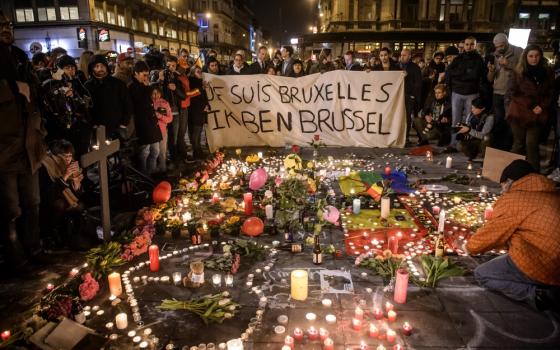The terror attacks last week in Brussels had many people asking: Why Belgium?
The answer given over and over is that unlike many countries in Europe, Belgium has large neighborhoods of disaffected youth who are ripe for radical Islamic recruitment.
If, as experts say, radicalism is embraced by those who have been victimized and left at the fringes of society because they see it as a way to fight back against a faceless, monolithic oppressor, then the West's usual response to terrorism only feeds the cycle: Massive military responses become further "evidence" of oppression and thus become recruiting tools for even more radicals.
What is the answer? More women religious — or at least more people doing the kind of work women religious do.
The people who experts say are ripe for terrorist recruitment are at the margins — exactly the people sisters serve day in and day out. Sisters' missions of feeding and clothing the poor, caring for the sick, being present and praying for the spiritually bereft are all tonics for the ills that lead to people being susceptible to radicalism, whether it is the perversion of a peaceful religion, the embrace of racial and ethnic hatred we're seeing rise in the United States, or the adoption of violence as the answer to any problem.
More importantly, sisters' work advocating for change and an end to systems that cause marginalization and disaffection sends another important signal to those they serve that it doesn't take violence to effect change.
Imagine if instead of deploying drones, we deployed the hands and feet of Christ — either the hands and feet of religious sisters or of ourselves, following their example.
Imagine if instead of sending missiles, we sent hope.
Imagine if instead of closing borders and building walls, we opened our arms and showed how opportunity and freedom can change lives.
Imagine if instead of letting terror divide us, we let love unite us.
This week, most of us will be awash in the glow of Easter, thinking about resurrection and new life. But for the disaffected, whether in a slum in Brussels, a refugee camp in the Middle East, a desperately poor rural community in the U.S. South or a prison-like public housing complex in a big city, it is still Holy Thursday. Shackled by poverty and policy, many are looking for someone to blame, and there are too many recruiters of all stripes willing to give them a sacrificial lamb.
We are left with several choices: We can join the crowd, shouting to crucify an innocent. We can stand on the sidelines and do nothing. Or we can begin working to change the conditions that led to the situation we find ourselves in.
And if we're not sure where to start, simply look to a sister for the example.
Still untouchable
If you think the Dalits, the "untouchables" in India's caste system, are a thing of the past, think again: Environmentalist Ranjan Panda writes on Big Wire that the system is, sadly, alive and well, especially when it comes to access to clean water, which can often be synonymous with access to power.
Even today, Panda writes, Dalits are less likely to have running water in their homes, more likely to have to walk long distances to get it, and are often denied water at public sources. Dalit students are often denied water in public schools.
Remember, links, tips and accounts of the response to any crisis anywhere in the world are always welcome at dstockman@ncronline.org.
[Dan Stockman is national correspondent for Global Sisters Report. Follow him on Twitter @DanStockman or on Facebook.]


